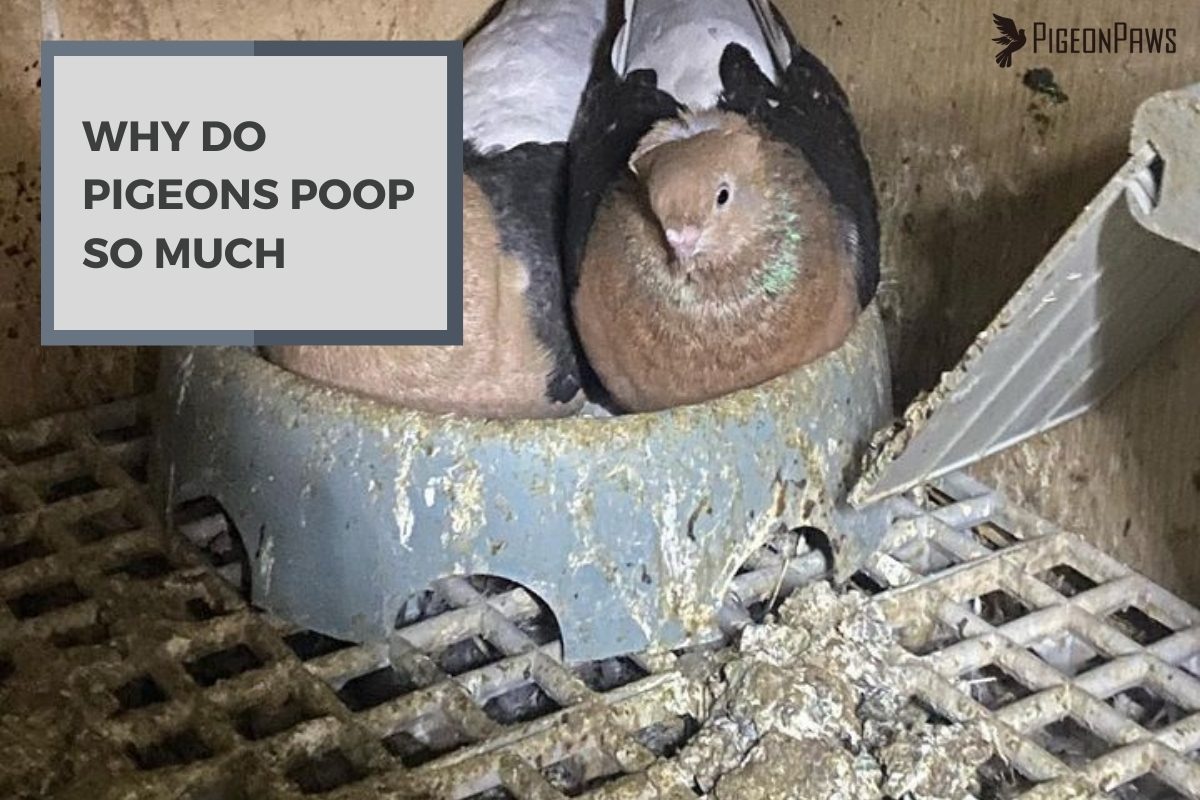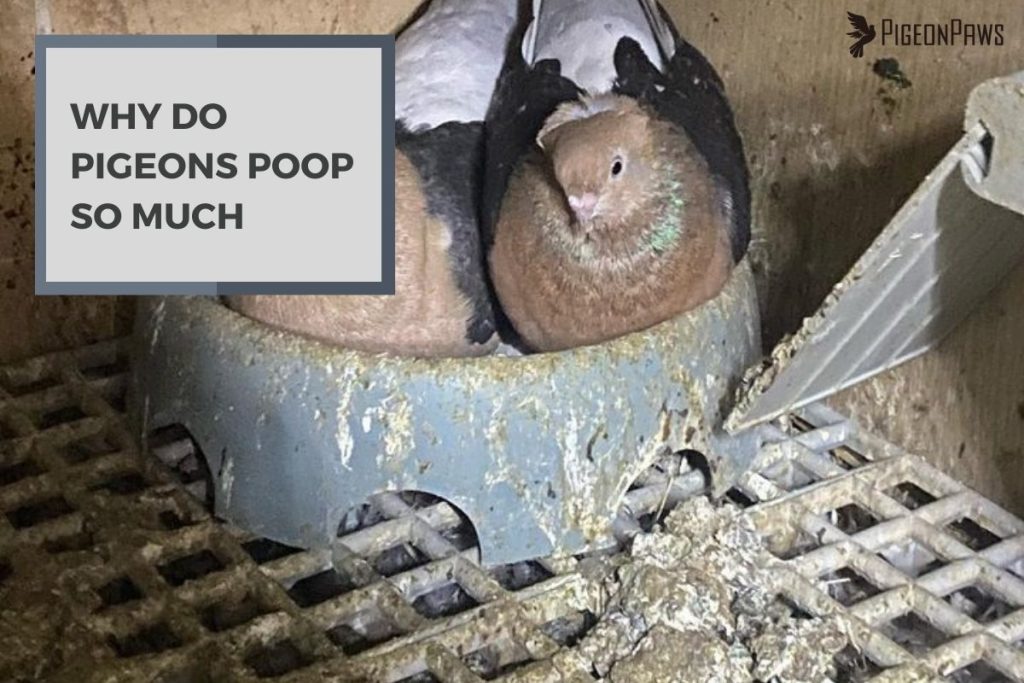Why Do Pigeons Poop So Much? Explore Its Purpose and Impact

Pigeons are a common sight in cities and towns all over the world, but they are not always welcomed with open arms. These birds have a reputation for being messy, and one of the main reasons for this is their tendency to poop excessively.
These birds have a very high metabolic rate, which is why they poop so much. They consume a large quantity of food and digest it quickly, so their bodies need to eliminate it quickly to maintain their high energy levels. The frequency of their droppings is a result of their high metabolic rate and the frequency of their meals.
This article will explore the reasons behind this behavior and provide insights into the function of pigeon poop, how much pigeons normally produce, and the effects of excessive pigeon poop on the environment and human health.

What are the Causes of Excessive Pigeon Poop?
While pigeon poop serves important functions for the birds, excessive amounts can lead to problems for both the pigeons and their environment. Causes of Excessive Pigeon Poop:
Quick Digesting Food
The birds exhibit a relatively high metabolic rate in comparison to other animals, resulting in efficient and rapid digestion of food. Consequently, the frequency of their defecation is heightened. This can lead to excessive amounts of pigeon poop, making it a nuisance in populated areas.
Unhealthy Diet
Pigeons fed an imbalanced diet consisting of processed or sugary foods tend to excrete a greater volume of feces compared to those fed a well-rounded diet comprising of seeds, grains, and other natural sources of nutrition.
Stress
Stressed pigeons, such as those living in overcrowded or unclean situations, create more feces than those living in nice, stress-free surroundings.
Disease
Sick birds with digestive or respiratory infections create more feces than healthy pigeons. They can also transmit illnesses like histoplasmosis and salmonellosis through their feces, posing a risk to human health.
Change in Habitat or Living Conditions
Pigeons that have been removed from their normal habitats or forced to live in strange situations may experience stress, which can lead to increased feces output. Understanding the causes of excessive pigeon poop is important to minimize its impact on the environment and human health.
How Much Do Pigeons Normally Poop?
Pigeons have a reputation for being prolific poopers, but just how much waste do they typically produce? The answer depends on multiple factors, including the species, the diet, and the environment.
Generally, the average pigeon is estimated to poop anywhere from 25 to 35 times a day. This means a single pigeon can produce up to 50 pounds of droppings per day.
While this may seem like a lot, it is a small fraction of the bird’s total body weight. Plus, this waste is highly nutritious and can be used as a valuable fertilizer.
By breaking down the droppings, microbes can convert the solid waste into a nutrient-rich compost that can be used to improve soil quality and promote plant growth.
How Does Pigeon Poop Affect the Environment and Human Health?
Pigeon poop is a widespread issue in cities worldwide. Despite their picturesque presence on public structures like buildings and statues, their droppings threaten the environment and human health. Impact of pigeon poop:
Aesthetic Impact
The aesthetic impact of pigeon droppings in public areas can be far-reaching. Not only do these droppings create an unappealing environment, but they can also have a negative effect on tourism and economic activities. Their droppings can tarnish buildings and monuments, rendering them less attractive to potential visitors.
Damage Buildings And Monuments
Pigeon feces contain a variety of acids, which can corrode metal surfaces and degrade stone and masonry. This can lead to costly repairs for building and monument owners.
Contain Harmful Bacteria
The droppings contain harmful bacteria, such as E. coli, and parasites like roundworms, leading to illnesses.
Water Contamination
The presence of pigeon droppings in water sources can release harmful pathogens that can potentially cause outbreaks of water-borne diseases.
Disease Spread
Pigeon poop can have a significant impact on both the environment and human health. Not only can their droppings contain hazardous materials such as nitrogen, phosphorus, and heavy metals, but their droppings can also spread potentially dangerous diseases such as histoplasmosis.
Histoplasmosis is a respiratory infection that can cause a wide range of symptoms, including fever, chest pain, and coughing, and can be life-threatening in certain cases.
Do Pigeons Poop Where They Eat?
Pigeons, unlike humans, do not have the ability to choose a specific spot in which to relieve themselves. Due to their high metabolism, pigeons need to eat often, and if they have already digested their previous meal, it is not uncommon for them to defecate where they are feeding.
This behavior is highly common among most birds, as they do not possess the same cognitive abilities as other animals.
Generally speaking, the birds do not cause any serious health concerns by defecating where they eat, as the birds’ droppings are not known to contain dangerous pathogens. But, it is still important to ensure that their area is kept clean and free of fecal matter to avoid any potential contamination.
The Amount of Feces Produced by Pigeons in a Day
What Causes Pigeons to Poop So Much on Balconies?
Pigeons are known to be frequent visitors to balconies, leaving their droppings behind. The causes and effects of pigeon behavior are interconnected, as their inclination to perch on outdoor structures, such as balconies, stems from the need for roosting and seeking shelter. Unfortunately, this also leads to an abundance of pigeon poop on balconies, which can be unsightly and potentially damaging to property if not promptly cleaned.
Conclusion
Pigeon poop can be a nuisance, but remember that pigeons are an important part of our environment and our cities. The excessive amount of poop they leave behind can be managed by taking steps to prevent them from roosting and nesting in urban areas.
It is also essential to remember that pigeon poop can be hazardous to human health, so appropriate precautions should be taken when cleaning up pigeon poop.
